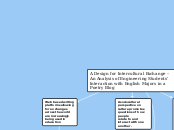A Design for Intercultural Exchange – An Analysis of Engineering Students’ Interaction with English Majors in a Poetry Blog
Web based writing platforms allowing for exchanges across the world
are increasingly being used in education
These recent forms of
textual practice are highly related to conditions offered by the technology,
allowing users, who previously were primarily consumers, to become
producers of text.
A sociocultural perspective on culture promotes questions of how people
relate to and interact with one another.
Through web based interaction, new
venues for groups are created, which in turn have raised questions of how
individuals become members of such groups, and how they contribute to the
group’s identity and culture
A key aspect highlighted in previous studies is the fact that users’ previous
experience with digital tools has a bearing on their communication. Thorne (2003)
describes three case studies of NSs meeting NNSs where computer mediated
communication (CMC) tools create conditions for language learning and
building linguistic as well as cultural relationships.
The nature of “production,
consumption, and co-construction of meaning and intention when intercultural
communication is mediated by such tools” is investigated.
Studies of intercultural digital exchanges commonly describe miscommunication
between participants caused by several issues. Frequently, there is a combination
of conditions involved, related both to the digital tool and to the differences
in nationality and language background
The intercultural poetry exchange was designed as part of two single-term
university literature courses, Fiction for Engineers in Sweden and World
Literature in the US.
The exchange took place in spring 2010, for a period of less than two weeks in the middle of term. The students were set to analyse the Swedish poet Tomas Tranströmer, as part of their respective literature courses which involved reading works by different authors
All in all there were 15 students from Sweden and 21 from the US. The students
from the Swedish university were technology students, primarily master’s
students from various engineering disciplines, such as computer science,
mechanical engineering, biotechnology, chemical engineering and interaction
design. From the US, the students were mainly freshmen, majoring in English, but also one student with a history major and one with a double major in English
and vocal performance.
The students were requested to read the three poems by Tomas Tranströmer that were posted on the blog and then respond to one, two, or all three.
They were to choose words or short central phrases, motivating their significance
and suggesting a theme of discussion.
Central concern was to investigate student blog interaction in an educational
environment and how it was possible for two such diverse groups with different
backgrounds, regarding academic discipline and nationality to make sense of
each other’s viewpoints.
Concerning the content of the blog postings, topics for discussion were put forward by the students themselves. The development of the content into discussion threads was founded on the students’ discussions of the poems, emanating from the various topics based on the translations provided and their understanding of the poems.
